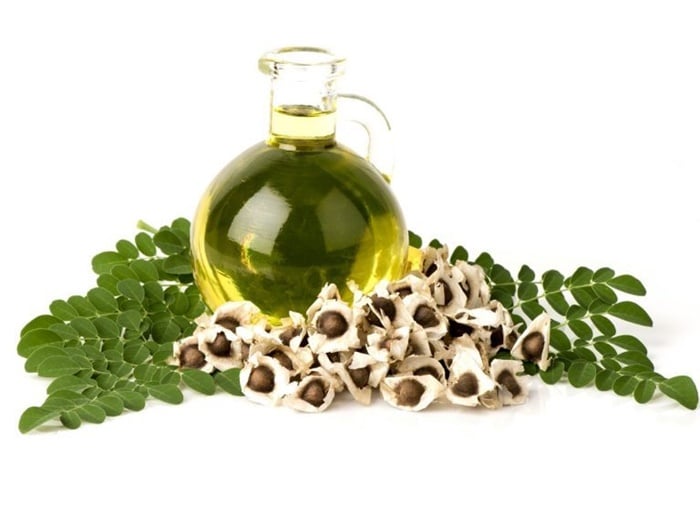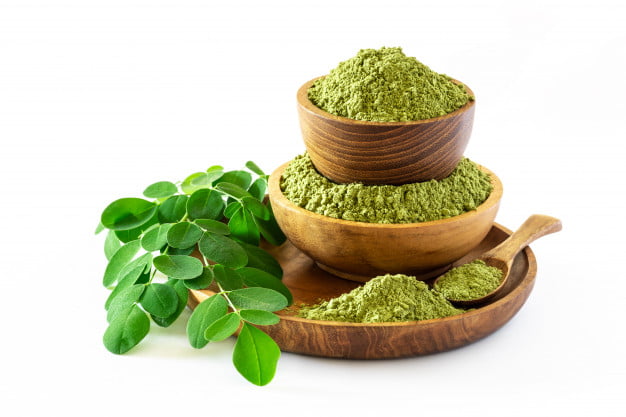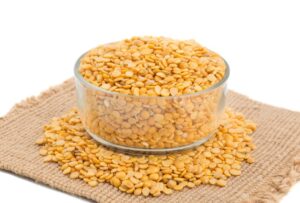Moringa (Moringa oleifera) is a small tree native to India. Due to its numerous healing properties, it is often called the “miracle tree”.
The tree is now popular in many regions in Africa, Asia, South America, and the Caribbean where it is commonly called Drumstick tree, Horseradish tree, Zogelle, Ben nut tree, Clarifier tree, Kelor tree, etc.
Moringa is used in folklore medicine to treat diabetes, anaemia, malnutrition, hypertension, arthritis, erectile dysfunction, and skin problems.
All the different parts of this miracle tree such as the leaves, seeds, flowers, bark, and stem all have amazing healing properties.
This article will give you evidence-based information on the nutrition, benefits, and side effects of moringa.
Nutrition facts
Moringa is highly nutritious. When compared to other foods, 100 g of dried Moringa oleifera leaves will give you [1]:
- 7 times more vitamin C than oranges
- 10 times more vitamin A than carrots
- 17 times more calcium than milk
- 9 times more protein than yogurt
- 15 times more potassium than bananas
- 25 times more iron than spinach
The leaves are also rich in vitamin B2 and B6, magnesium, zinc, phosphorus, and contain little healthy fat.
Health benefits of moringa
This miracle plant is beneficial to health, skin, hair, and male fertility. The following are the health benefits:
1. Rich in antioxidants
Antioxidants are compounds that protect your body cells against free radicals which may play a role in heart disease, cancer, and other metabolic disorders.
Studies have shown that the leaves of Moringa oleifera are rich in antioxidants called phenolic compounds [2].
Examples of three phenolic compounds found in M. oleifera are:
- Quercetin: A powerful polyphenolic flavonoid that helps reduce blood pressure. [3], [4]
- Chlorogenic acid: A phenolic compound that is also found in coffee and helps to regulate blood sugar levels. [5]
- Isothiocyanates: A compound that helps reduce insulin resistance and fight inflammation. [6]
The leaves are also rich in vitamin C and carotenoids – two important antioxidants that fight against oxidative damage. [7]
2. Lowers blood sugar levels
A high blood sugar level is a common symptom in people with diabetes. And if left untreated could cause life-threatening issues.
Several animal studies have shown the blood-glucose-lowering effects of moringa, however, more human studies are needed to verify these claims. [8]
Although, one human study in 27 people showed that taking a meal supplemented with 20 grams of M. oleifera leaf powder reduced the glycemic meal response in those with diabetes. [9]
Another Indian study found that adding M. oleifera leaf powder to a meal reduced blood glucose response in 6 human subjects. [10]
3. Lowers cholesterol levels
High cholesterol levels have been linked to heart disease, stroke, and other metabolic diseases.
Studies have found that leaf extracts of M. oleifera may have cholesterol-lowering properties in high-fat, diet-fed rat models. [11], [12]
Also, some plant foods like oats, flaxseed, beans, okra, and eggplant may help to reduce cholesterol.
4. Reduces inflammation
Inflammation is the body’s natural response to injury or infection. However, it becomes a problem if it continues over a prolonged period.
Prolonged inflammation has been linked to chronic diseases like heart disease, cancer, and diabetes. [13]
Interestingly, moringa has been in use in traditional medicine to treat pain and inflammation.
Some animal studies have found that phenolic compounds abundant in the leaves, seeds, and fruits of Moringa oleifera may be responsible for its anti-inflammatory properties. [14]
5. Fights against microbial infection
The seeds, leaf, bark, and stem extracts of moringa have been tested and found to have antimicrobial activities.
One study found that extracts of Moringa oleifera showed antibacterial and antifungal activities. [15]
Another study reported that the leaves could be a promising alternative for the treatment of bacterial infections especially gram-negative infections. [16]
6. Improves bone health
Moringa leaves are rich in calcium and phosphorus – two important elements needed for bone growth and nourishment.
Additionally, since moringa has anti-inflammatory activity, it may help to combat arthritis, rheumatism, and strengthen weak bones.
7. Promotes weight loss
The leaves of moringa are rich in fiber which may help you to stay full for longer periods, thereby aiding weight loss.
Also, Moringa oleifera leaf extract helps to lower blood cholesterol levels, although more human studies are required. [11]
8. Prevents anemia and malnutrition
Moringa oleifera leaves are incredibly rich in iron and other important nutrients that fortify the body.
One African study in Senegal found that pregnant women fully recovered from anemia and gave birth to babies with higher birth weights after fortifying their foods with moringa. [17]
9. Improves milk production
The leaves of M. oleifera have been in use to increase lactation in breastfeeding mothers in traditional ancient medicine.
Recent studies have proven its use as a galactagogue, as it is confirmed to improve milk production and appetite in lactating mothers. [18]
Scientists believe that moringa increases lactation by stimulating the production of prolactin – the hormone that promotes milk flow. [19]
10. Protects against arsenic toxicity
Prolonged arsenic poisoning is very dangerous and can lead to cancer and skin lesions.
Interestingly, animal studies have found that M. oleifera leaves and seeds may protect against some side effects of arsenic toxicity. [20], [21]
However more human studies are needed to verify these claims.
Benefits of Moringa for Hair

Moringa leaves and seed oil are rich in antioxidants that protect your hair against free radicals and boost keratin production.
Also, the leaves are excellent sources of essential minerals like zinc which is necessary for healthy hair growth.
Adding moringa-based hair products to your hair care routine restores strength, promotes hair growth, and repairs damaged hair.
Benefits of Moringa for Skin
Moringa is rich in vitamin A and C – two important vitamins required for healthy eyes and skin.
When applied topically, it encourages the renewal of dead skin cells, blurs blemishes, and clears pigmentation.
Additionally, moringa has both antimicrobial and anti-inflammatory activity which helps to reduce bacterial growth, inflammation, and breakouts.
Benefits of Moringa for Men
Moringa oleifera may improve fertility and fight against erectile dysfunction in men due to its rich antioxidant content.
Studies have found that moringa may help increase sperm count and production in rat models with induced undescended testicles. [22]
Another animal study found that M. oleifera leaf extracts showed aphrodisiac properties and reduced oxidative damage in stressed rats which led to increased testosterone production. [23]
Although these animal studies show improvement, more human studies are required to fully back up these claims.
Also read: 20 best African Fertility Foods for men and women
Possible side effects

Moringa leaves, fruits, and seeds are PROBABLY SAFE when eaten short term as food. However, the roots and bark may be UNSAFE IN PREGNANCY, as the roots contain spirochin, a toxic chemical.
Also, Moringa may possess anti-fertility properties and should be avoided in pregnancy and in women trying to conceive.
Remember to speak to your doctor or pharmacist before taking any dietary supplements.
Possible drug interactions
Be aware of these medications if you are taking Moringa oleifera:
- Levothyroxine: Taken for low thyroid function. Taking moringa along with levothyroxine might decrease the absorption and effectiveness of levothyroxine.
- Drugs that are broken down by the liver: Some drugs are changed and broken down by the liver. Moringa extracts may decrease how quickly the liver breaks down these medications – leading to increased side effects.
- Drugs for diabetes: Since M. oleifera extracts lower blood sugar levels, taking diabetes drugs alongside might cause your blood sugar to go too low. So monitor your sugar levels closely.
- Drugs for high blood pressure: Certain drugs lower blood pressure effectively. Combining these drugs with moringa might cause your blood pressure to go too low. So always monitor your blood pressure closely.
The bottom line
Moringa oleifera is an ancient miracle tree that is abundant in antioxidants, protein, vitamins, and minerals.
The different plant parts, especially the leaves and seeds are effective in reducing blood sugar levels, inflammation, malnutrition, and high blood pressure levels.
However, only a few of its many reputed health benefits have been studied in humans, therefore more scientific studies are required.
Always consult a health practitioner before trying new herbal supplements.
23 Sources
- Meireles D. et al. A review of properties, nutritional and pharmaceutical applications of Moringa oleifera: integrative approach on conventional and traditional Asian medicine. ADV TRADIT MED
- Arti V. et al. In vitro and in vivo antioxidant properties of different fractions of Moringa oleifera leaves. Journal of food and chemical toxicology.
- Edwards RL. et al. Quercetin reduces blood pressure in hypertensive subjects. J Nutr. 2007.
- Larson A.et al. Therapeutic potential of quercetin to decrease blood pressure: a review of efficacy and mechanisms. Adv Nutr. 2012
- Van Dijk AE. et al. Acute effects of decaffeinated coffee and the major coffee components chlorogenic acid and trigonelline on glucose tolerance. Diabetes Care. 2009
- Kooltheat N. et al. An ethyl acetate fraction of Moringa oleifera Lam. Inhibits human macrophage cytokine production induced by cigarette smoke. Nutrients. 2014
- Padayatty SJ, et al. Vitamin C as an antioxidant: evaluation of its role in disease prevention. J Am Coll Nutr. 2003
- Ndong M, et al. Effects of Oral Administration of M. oleifera Lam on Glucose Tolerance in Goto-Kakizaki and Wistar Rats. J Clin Biochem Nutr. 2007
- Leone A, et al. Effect of Moringa oleifera Leaf Powder on Postprandial Blood Glucose Response: In Vivo Study on Saharawi People Living in Refugee Camps. Nutrients. 2018
- Felicia William et al. Effect of some Indian vegetables on the glucose and insulin response in diabetic subjects.
- Ghasi O. et al. Hypocholesterolemic effects of crude extract of leaf of Moringa oleifera Lam in high-fat diet-fed Wistar rats. J Ethnopharmacol. 2000.
- Mehta K. et al. Effect of fruits of Moringa oleifera on the lipid profile of normal and hypercholesterolaemic rabbits. J Ethnopharmacol. 2003
- Furman D. et al. Chronic inflammation in the etiology of disease across the life span. Nat Med. 2019
- Suleiman M. et al. Evaluation of M. oleifera Aqueous Extract for Antinociceptive and Anti-Inflammatory Activities in Animal Models.
- Arora DS. et al. Bioprospecting of Moringa (Moringaceae): microbiological perspective. J Pharmacog Phytochem.
- Peixoto JR. et al. In vitro antibacterial effect of aqueous and ethanolic Moringa leaf extracts. Asian Pac J Trop Med.
- Fuglie, LJ 2001. Combating malnutrition with Moringa. Church World Service, Senegal. Scientific Research Publish.
- Raguindin PF. et al. M. oleifera as a Galactagogue. Breastfeed Med. 2014
- Foong SC. et al. Oral galactagogues for increasing breast-milk production in mothers of non-hospitalized term infants. In: Cochrane Database of Systematic Reviews.
- Sheikh A. et al. Protective effects of M. oleifera Lam. leaves against arsenic-induced toxicity in mice. Asian Pac J Trop Biomed.
- Chattopadhyay S. et al. Protective role of Moringa oleifera (Sajina) seed on arsenic-induced hepatocellular degeneration in female albino rats. Biol Trace Elem Res. 2011
- Afolabi AO. et al. Effects of methanolic extract of M. oleifera leaves on semen and biochemical parameters in cryptorchid rats. Afr J Tradit Complement Altern Med. 2013
- Prabsattroo T. et al. M. oleifera extract enhances sexual performance in stressed rats. J Zhejiang Univ Sci B. 2015
- https://www.freepik.com/premium-photo/moringa-powder-moringa-oleifera-wooden-bowl-with-original-fresh-moringa-leaves-isolated-white-background_5236388.htm#page=1&query=moringa%20oleifera&position=9
Get new free and exclusive health tips delivered straight to your inbox!



